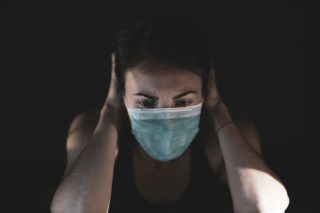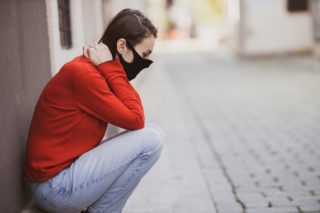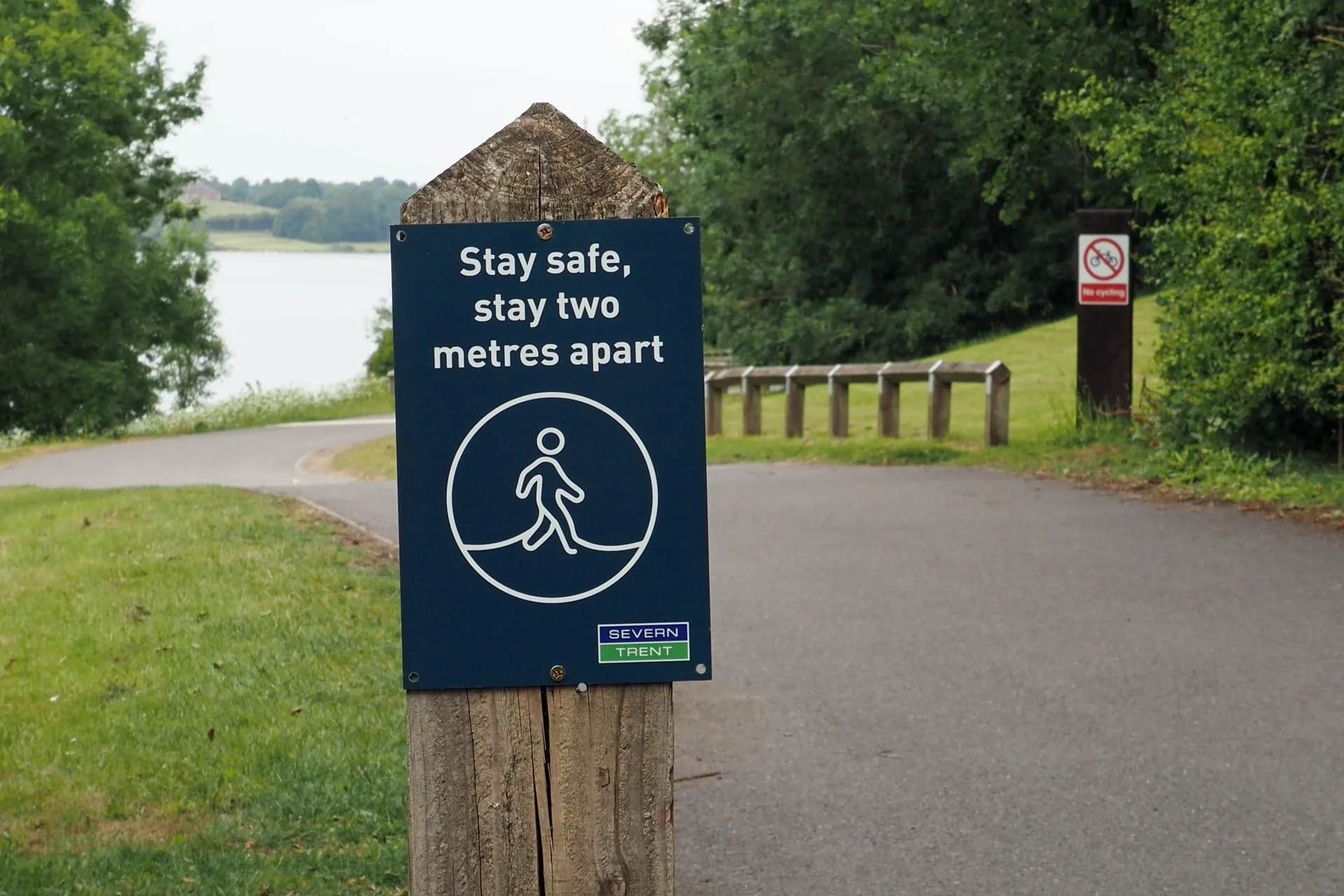While some of us have been looking forward to post-lockdown living because it’ll give us a chance to have a social life again, there are some people who are battling with post-lockdown anxiety at the thought of re-entering the world.
Now while we’re all looking forward to seeing our family and reconnecting with friends, the much-anticipated changes that come with the gradual easing of lockdown may affect our mental health. Common responses to these changes are fear and anxiety as we worry about what may meet us as we re-enter the real world.
Somehow, we’ve all become comfortable with the new “normal” of spending the majority of our time indoors, and the new adjustment may take some getting used to – no matter how much we’ve looked forward to it.
If you find yourself worried and anxious about life after lockdown, you may be experiencing what experts calling ‘post-lockdown anxiety’.
What is post lockdown anxiety?
“It’s the fear or worry of returning to normal life and leaving lockdown,” explains Samuel Ledger of Anxiety UK. “This can develop from many places, the most common we tend to see seems to originate from health worries or a fear of the unknown. It can range from a worry of being in public spaces to a fear of leaving the house in general.”
Eventually, we adjusted to the new normal, during the lockdown period and as a result, we felt safer and protected in our homes. Now with the easing of restrictions, our normal has once again been affected, and it’s left us fearing the unknown. In fact, we also begin to lose our confidence to do things that we did before the lockdown, such as taking public transport.
Signs and symptoms

Photo by engin akyurt on Unsplash
You may be battling with post-lockdown anxiety if you find yourself constantly worried about the future, feeling unsettled or tense, issues with sleeping, constantly checking the news or social media about COVID-19 or lockdown rules, and in extreme cases, possible panic attacks.
Now while fear and anxiety can help you practice caution and prevent you from being irresponsible, high levels of post-lockdown anxiety may lead to an anxiety disorder, such as social anxiety, and this can cause serious health problems. Additionally, high anxiety levels can also lead to unhealthy coping strategies such as alcohol and drug abuse as well as over-eating.
Thankfully, there are ways to mitigate your anxiety and fears about returning to the outside world.
8 ways to manage post-lockdown anxiety
1. Allow yourself to be scared
There are a few things in life that you can control, and a pandemic is not one of them.
The world is dealing with a pandemic and there are not a lot of things that you won’t be able to control. Therefore, stop living in denial and accept things for what they are. Doing so will help you manage your feelings and emotions better.
Everyone around you may have it all figured out, but you’re allowed to have your own reaction and anxieties about the situation. There’s nothing embarrassed about if you’re feeling scared or worried about the future. Suppressing and ignoring these feelings will only make things worse in the long run.
2. Take it one day at a time
It’s normal to think and plan about the future, but in a pandemic, this thinking can only heighten your anxiety. It’s best to take things one day at a time and focus on living through today.
You may notice that other people are welcoming the easing of lockdown with open arms, but it’s important not to guilt yourself into doing things you’re not ready to do. Don’t push yourself to visit friends or go outside your home if you’re not ready as this may even trigger a panic attack. Don’t feel bad if you’re taking longer to adjust than others – move at your own pace.
3. Practice self-care
Self-care practices like mindfulness, journaling, and even gardening can help to ease as well as manage any anxious feelings that you may have.
What’s more, having a stronger hold on your mental health can make you better equipped to handle the unknowns that may come with post-lockdown living.
It’s also important to try to eat a healthy diet, limit alcohol consumption, as well as get good-quality sleep.
4. Exercise
One way to manage post-lockdown anxiety is by staying fit.
For instance, one study found that people with anxiety tend to be more sedentary and do less intense forms of physical activity and this is ironic because a 2018 study found that high-intensity exercise regimens were found to be viable treatment options for anxiety.
High-intensity exercises include mountain climbers, burpees as well as side plank variations. The good news is a lot of gyms are opening up, so you can get back into your fitness game. Now if you still have concerns about visiting the gym, you’ll be happy to know that there are plenty of ways you can exercise at home.
5. Plan ahead
Planning ahead is a great way to manage any of your post-anxiety woes. The best thing to do would be to consider which situations you’re feeling particularly anxious about and figure out what you could do in this situation to help ease your worries.
For example, if you’re anxious about visiting the store, perhaps you can find a time when it’ll be less busy? Say midday on a Wednesday afternoon? Or, if you’re anxious about more joggers in the morning, perhaps you could pick a later time in the evening to get your run in? Or maybe you’re worried about taking public transport? If so, why don’t you try to find another way to travel? If not, perhaps you could speak to the driver and ask them about the precautions they’re taking to reduce the spread of the virus?
6. Only consume accurate information
Yes, it’s important to stay informed when it comes to the coronavirus, but it’s also important that you don’t rely on WhatsApp chain messages for your information.
Being well-informed can help cope with uncertainty yet unreliable, sensational information can only serve to heighten your anxiety. Therefore, it’s important to only consume information from reliable and credible sources such as the CDC and WHO.

Photo by engin akyurt on Unsplash
That said, even if your news sources are credible, too much news can make you feel anxious and increase your desire to avoid the outside world. That said, it’s important to limit your news exposure to at least once a day. It would be advisable to check the news around your area on the day that you plan on leaving the house. This will help you make an informed decision.
7. Reach out
Isolation can also have a negative effect on mental health. So, it’s important to stay connected with your friends and family. Yes, you may not want to join them at your favorite café for a quick meal. However, that doesn’t mean that you shouldn’t stay in touch.
When speaking to your friends and family, don’t shy away from sharing your fears and concerns. Additionally, if you have concerns about returning to work, it’s important that you speak to your supervisor and colleagues.
8. Seeking professional help if necessary
If you continue to battle crippling thoughts and feelings, as well as trouble sleeping, difficulty with daily tasks, or an increase in alcohol or drug use, then you may need to seek professional help. The good news is, you don’t have to leave your home to get help. This is because many doctors have begun tele-consultations.
That said, the video below shares an expert opinion on how you can readjust to post-lockdown life.
Watch our YouTube video
Dr. Siobhan Dawson is a psychiatrist and integrative health specialist. In this video, she spoke to Gisèle Wertheim Aymés about how to re-adjust your life post-lockdown.
Want to know more?
Working exclusively from home can affect your mental health. Thankfully, there are ways to protect your mental health by having a healthy work-from-home life.
References
Aylett, E., Small, N. & Bower, P. (2018). Exercise in the treatment of clinical anxiety in general practice – a systematic review and meta-analysis. BMC Health Serv Res 18, 559. https://doi.org/10.1186/s12913-018-3313-5
Helgadóttir, B., Forsell, Y., & Ekblom, Ö. (2015). Physical activity patterns of people affected by depressive and anxiety disorders as measured by accelerometers: a cross-sectional study. PloS one, 10(1), e0115894. https://doi.org/10.1371/journal.pone.0115894



![women [longevity live]](https://longevitylive.com/wp-content/uploads/2020/01/photo-of-women-walking-down-the-street-1116984-100x100.jpg)










